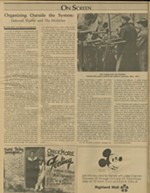Venice/venice
1992, R, 108 min. Directed by Henry Jaglom. Starring Henry Jaglom, Nelly Alard, Suzanne Bertish, Melissa Leo.
REVIEWED By Louis Black, Fri., Dec. 4, 1992
From Venice, Italy, where independent filmmaker Dean (Jaglom) has his newest work in competition at the Film Festival (and where he meets, romances and loses French journalist Jeanne (Alard) to Venice, California where Alard mysteriously reappears and Dean casts a movie, Venice/Venice is a Möbius strip that wraps around its maker, Henry Jaglom. Since his audacious debut as a director with the problematic A Safe Place in 1971, Jaglom has charted an idiosyncratic career managing to turn out eight extremely personal films -- four of them in the last five years -- and finally mastering the business end by raising his money in Europe where he is more popular. Jaglom's narcissism is undeniable, and though this film has a fictional plot, with a lot of clever twists, it basically is another self-examination. Jaglom is not for everyone; his are extremely indulgent, sentimental works that feature Jaglom as the unlikeliest romantic hero since Woody Allen. The difference is that Allen still entertains, participating in the construction of fictions, playing a character, even though the character is clearly autobiographical. Jaglom goes further. He allows you the luxury of not liking him. Venice/Venice (it's hard to talk about much of his work as separate films) is perhaps the smartest home movie ever made, or maybe that it is a Hollywood-ized home movie. In a Return of the Secaucus 7--way, we feel we know and that we are these people and yet it is a film, not reality. The narrative is intercut with short talking head snippets of women talking about their relationships with the myth of movies and the reality of their own lives. Even though Jaglom defends his obsession with women (his recent films have tended to feature Jaglom and a large cast of women), he still comes off as exploitative and fawning, as though he's always looking for love, looking for a mommy to tell him things are okay. But the strength of his films is that you can have a complex attitude towards Jaglom. Surprisingly, for a film where talk is so crucial, (and this film is an intellectual, romantic and narrative exploration fueled by talk), he is a remarkably cinematic director. Jaglom wants us to confront the way we watch movies which is the way we think, the way we dream and the way we love. The great failure in Jaglom's world is one of communication, and usually that's because we know as little about ourselves as we do about others. Jaglom's extraordinary exploration of self, involves us in his life as a complex and contradictory, emotional and intellectual whole that is both cloying and revealing.
A note to readers: Bold and uncensored, The Austin Chronicle has been Austin’s independent news source for over 40 years, expressing the community’s political and environmental concerns and supporting its active cultural scene. Now more than ever, we need your support to continue supplying Austin with independent, free press. If real news is important to you, please consider making a donation of $5, $10 or whatever you can afford, to help keep our journalism on stands.
Marc Savlov, March 29, 2002
May 3, 2022
Venice/venice, Henry Jaglom, Henry Jaglom, Nelly Alard, Suzanne Bertish, Melissa Leo








